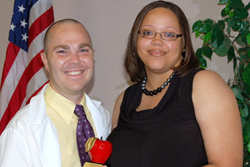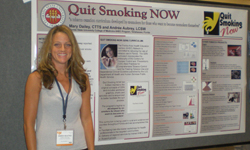
| FACULTY NEWS |
|
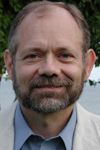 Dennis Mayeaux, M.D., Pensacola family-medicine clerkship and informatics
director, was installed in July as president of the
Florida Academy of
Family Physicians. In fact, remarkably, all six College of Medicine campuses
are represented on the FAFP board. Here’s other recent FAFP news involving
people with ties to the College of Medicine: Dennis Mayeaux, M.D., Pensacola family-medicine clerkship and informatics
director, was installed in July as president of the
Florida Academy of
Family Physicians. In fact, remarkably, all six College of Medicine campuses
are represented on the FAFP board. Here’s other recent FAFP news involving
people with ties to the College of Medicine:
These doctors with College of Medicine connections are already on the board of directors: Alma Littles, M.D., senior associate dean for medical education and academic affairs, past president of FAFP and delegate to AAFP; Daniel Van Durme, M.D., past president of FAFP and FSU family-medicine department chair; Coy Irvin, M.D., Pensacola Community Board; Jennifer Keehbauch, M.D., Orlando clerkship faculty; Greg Sloan, M.D., Chipley, summer clinical practicum faculty; and Ira Pearlstine, M.D., Fort Pierce clerkship faculty. And these College of Medicine people are leaving the board: Cyneetha Strong, M.D., Year 1/2 preceptor, outgoing board chair; and Kim Plumitallo Maguire, Class of 2011, outgoing student director. TELLING TALLAHASSEE’S STORY IN WASHINGTON In late July Dr. Littles went to Washington, D.C., for “How Do They Do That? Low-Cost, High-Quality Health Care in America,” organized by the Institute for Healthcare Improvement. Tallahassee was one of 10 communities asked to discuss their successes in providing health care.The communities were chosen by examining per capita Medicare costs and federal data on hospital performance and patient satisfaction. Littles was a guest of Tallahassee Memorial Hospital, which President Obama praised in a recent speech. “I was honored to be a part of the Tallahassee team as the work being done by Capital Health Plan and TMH, both of whom are our educational partners, fit well with our mission,” she said. “They have proven that having a strong primary care base; using information technology; and gathering, analyzing and utilizing data can lead to improved, patient-centered, efficient and cost-effective patient care. These are the models of medical practice we want our students to see and emulate.” According to a Kaiser Health News account of the session, these themes emerged:
“The fact that IHI sought out areas of the country where health care is being provided in a quality, yet cost-effective manner was actually a breath of fresh air amidst all the political posturing going on with health-care reform discussions elsewhere," Littles said. "I felt that I was attending a meeting where worthwhile conversation was taking place that might actually lead to a process where more patients would be able to obtain needed health care, as opposed to a conversation dominated by who would get the money for providing those services. “I know that there are significant costs to providing health care. And as a family physician, I also know that providing necessary primary and preventive services in a setting of trust can delay or avoid morbidity and the need for more advanced and expensive procedures and services. I hope we as a nation can come together and ‘do the right thing.’” Read the full Kaiser Health News article. FL CURED NOW BASED IN COLLEGE OF MEDICINE 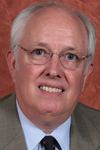 The
College of Medicine is the new home of a think tank created to coordinate
Florida’s efforts at curing diseases. The Florida Department of Health
entered into an agreement with the college to operate the Florida Center for
Universal Research to Eradicate Disease (FL CURED) for the next three years.
The center previously operated out of the Florida Department of Health. Its
new home is in the college’s Division of Research and Graduate Programs. The
College of Medicine is the new home of a think tank created to coordinate
Florida’s efforts at curing diseases. The Florida Department of Health
entered into an agreement with the college to operate the Florida Center for
Universal Research to Eradicate Disease (FL CURED) for the next three years.
The center previously operated out of the Florida Department of Health. Its
new home is in the college’s Division of Research and Graduate Programs.
“The Florida Department of Health is demonstrating its confidence in FSU’s ability to champion collaboration among the public and private research enterprises of the state to prevent, treat and cure deadly and debilitating diseases,” said Michael Smith, director of the college’s Network for Clinical Research and now also principal investigator in charge of FL CURED. The College of Medicine is a perfect fit for that mission, said Myra Hurt, Ph.D., senior associate dean for research and graduate programs, because of its six regional campuses and network of physicians who serve as faculty for third- and fourth-year students. “Those 1,500 faculty-clinicians are treating upwards of 3 million Floridians,” Smith said. “In our Network for Clinical Research, we already are beginning to link them to the research enterprise of the university and College of Medicine to better translate basic research into medical care. Now, with FL CURED, we will continue to build on the innovative, community-based model of the college to encourage partnerships between researchers, treating physicians and community hospitals.” Get more information about FL CURED.
The Florida Coalition was originally formed in 1999 as a state organization of the National Association for School Based Health Centers. Its mission is to promote access to quality physical and mental health services that meet the unique needs of Florida’s children, youth and families. The Florida Coalition obtained a small grant for reactivation in January 2009 and held its state meeting in June. Dr. Blackburn was elected then. Goals include updating grassroots advocacy efforts and developing long-term strategies to sustain funding.
The board produces examinations across all health-related fields, each of which evaluates candidates for medical licensure. The tests provide a national standard to compare and assess medical professionals’ expertise and abilities. Serving on a test committee is an honor. Dutton said he thinks the college’s curriculum and approach to health education played a sizable role in his appointment. “If you look at the kind of work that the college has allowed me to do in the behavioral-sciences educational domain,” he said, “I think that probably strengthened my credibility in the board’s eyes.” RWJF GRANT TARGETS OBESITY IN LATINO CHILDREN Javier Rosado, Ph.D., who works as a postdoctoral psychology fellow at the College of Medicine’s clinical training site in Immokalee, will run a two-year, $75,000 project studying how well rural clinics and school health programs inform Latino parents about their children’s weight. Funding comes from the Robert Wood Johnson Foundation (RWJF), a first for the College of Medicine.Childhood obesity has become increasingly worrisome for many American families, and Latino children in particular are more likely to gain dangerous extra pounds. The study will be based in Immokalee, where the college’s clinical training site serves a predominantly Latino population of migrant workers, as well as in Quincy. RWJF created the “Salud America!” program in late 2007 to provide support for researchers studying the obesity epidemic in Latino children. Last month, the foundation notified Rosado that his proposed project had gotten the green light. Latino kids’ heightened susceptibility to obesity has been increasingly noted and analyzed over the past decade. According to a 2006 study by the Mathematica Policy Research Group, 25 percent of Latino children end up obese by age 3, compared with 16 percent of black children and 14 percent of whites. Rosado and his colleagues will interview parents after children’s routine medical checkups. “The long-term goal is to change the policies of these clinics,” he said. “We think BMI [body-mass index] will be the most helpful tool to explain children’s weight to families. Hopefully we’ll be able to show the clinics how they can use BMI information to improve their patients’ care.” Said Myra Hurt, Ph.D., the college’s senior associate dean for research and graduate programs, “Dr. Rosado’s findings will directly translate to helping other communities throughout our country.” FACULTY COUNCIL AWARDS Congratulations to the recipients of these Faculty Council Awards, which were given out June 4: Outstanding
Junior Faculty Educator – Mary Gerend, Ph.D., assistant professor of
medical humanities and social sciences. Here’s a nomination excerpt: “Her
work in Medicine & Behavior II has been exemplary. We instituted reflective
writing in the class this year. As a result, we have had to grade over 1,800
papers this semester alone! In all cases, she has been dedicated to
completing this assignment, even offering to help other faculty complete
their reviews of the papers. Most importantly, her review comments are
insightful and helpful to the students.” Outstanding
Junior Faculty Educator – Mary Gerend, Ph.D., assistant professor of
medical humanities and social sciences. Here’s a nomination excerpt: “Her
work in Medicine & Behavior II has been exemplary. We instituted reflective
writing in the class this year. As a result, we have had to grade over 1,800
papers this semester alone! In all cases, she has been dedicated to
completing this assignment, even offering to help other faculty complete
their reviews of the papers. Most importantly, her review comments are
insightful and helpful to the students.”
MORE AWARDS & HONORS Ray Bellamy, M.D., surgery clerkship director at the Tallahassee campus since 2004 and an active member of Tallahassee’s medical community for 35 years, has received the Capital Medical Society's 2009 Outstanding Physician Award. The award recognized his leadership “through volunteer work in the community, involvement in organized medicine and political activities, clinical excellence and contributions to education, particularly concerning medical students.” Besides his teaching, the award saluted Bellamy for:
Randall Bertolette, M.D., dean of the Fort Pierce Regional Campus, is receiving a Certificate of Appreciation from the Florida Medical Association. According to the FMA, Bertolette was chosen from a number of excellent nominees not only for his extraordinary professional achievements but also for his clear dedication to the practice of medicine in the broadest sense. He'll receive the award in Key Largo on Oct. 18.
PUBLICATIONS Ken Brummel-Smith, M.D., Charlotte Edwards Maguire, M.D., chair and professor of geriatrics, was co-author of “Strength and Influence of Geriatrics Departments in Academic Health Centers” in the May 2009 issue of Academic Medicine. Here’s the last sentence of the abstract: “The challenge for the future will be to definitively demonstrate the efficacy of the department model versus the more prevalent section, division, and institute approach to training physicians to care for the elderly.”In that same issue of Academic Medicine, Dr. Brummel-Smith also was co-author of a commentary, “Aging America: Meeting the Needs of Older Americans and the Crisis in Geriatrics.” Here’s an excerpt: “Why, after more than 30 years of warnings, studies, and reports, do we still not have sufficient geriatric training for all medical students and sufficient numbers of geriatricians? Why are the numbers of geriatricians dramatically declining even as our population ages? There are numerous reasons, but foremost is the strong financial disincentive for entering the field of geriatrics. Medical students are economically driven to seek out higher-paying specialties as a result of increasing educational debt. In geriatrics, the situation is actually perverse— students who complete an extra year of training in geriatrics can expect their earning power to actually decrease compared with those who do no additional training and enter practice.” 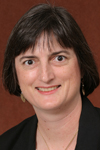 Lisa
Granville, M.D., associate chair and professor of geriatrics, also
co-wrote an article in the May 2009 issue of Academic Medicine. Quite a
compelling headline: “Keeping Granny Safe on July 1: A Consensus on Minimum
Geriatrics Competencies for Graduating Medical Students.” The last paragraph
of the abstract put it in context: “Setting minimum geriatric competency
standards establishes the performance benchmarks for medical school
graduates who as first-year residents will care for geriatric patients. Only
half facetiously, they are referred to as the ‘Don’t Kill Granny’
competencies. Achievement of these minimum competencies by medical students,
grounded in evidence-based principles of quality care for older adults, will
assure that, each year, older patients are in safer hands on July 1.” Lisa
Granville, M.D., associate chair and professor of geriatrics, also
co-wrote an article in the May 2009 issue of Academic Medicine. Quite a
compelling headline: “Keeping Granny Safe on July 1: A Consensus on Minimum
Geriatrics Competencies for Graduating Medical Students.” The last paragraph
of the abstract put it in context: “Setting minimum geriatric competency
standards establishes the performance benchmarks for medical school
graduates who as first-year residents will care for geriatric patients. Only
half facetiously, they are referred to as the ‘Don’t Kill Granny’
competencies. Achievement of these minimum competencies by medical students,
grounded in evidence-based principles of quality care for older adults, will
assure that, each year, older patients are in safer hands on July 1.”Suzanne Johnson, Ph.D., professor and outgoing chair of medical humanities and social sciences, was co-author of “Parent Reactions to a School-Based Body Mass Index Screening Program” in the May Journal of School Health. Here are the conclusions as stated in the abstract: “Most parents, and ethnic-minority parents in particular, viewed school-based BMI screening and after-school exercise programs favorably. Parents reported taking action in response to a BMI result outside of the normal range. Parents who were overweight themselves were particularly interested in family cooking and exercise classes.” |
 |
 |
 |
| E-mail Alumni Affairs Phone: 850-645-9428 | ||
|
|
|
Florida State University
|
College of Medicine
|
Copyright 2013
|
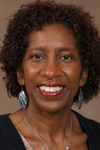 MAGGIE
BLACKBURN TAKES NEW STATEWIDE ROLE
MAGGIE
BLACKBURN TAKES NEW STATEWIDE ROLE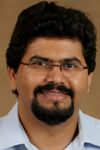
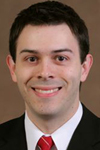 DUTTON
INVITED TO HELP DEVELOP USMLE TEST MATERIALS
DUTTON
INVITED TO HELP DEVELOP USMLE TEST MATERIALS







